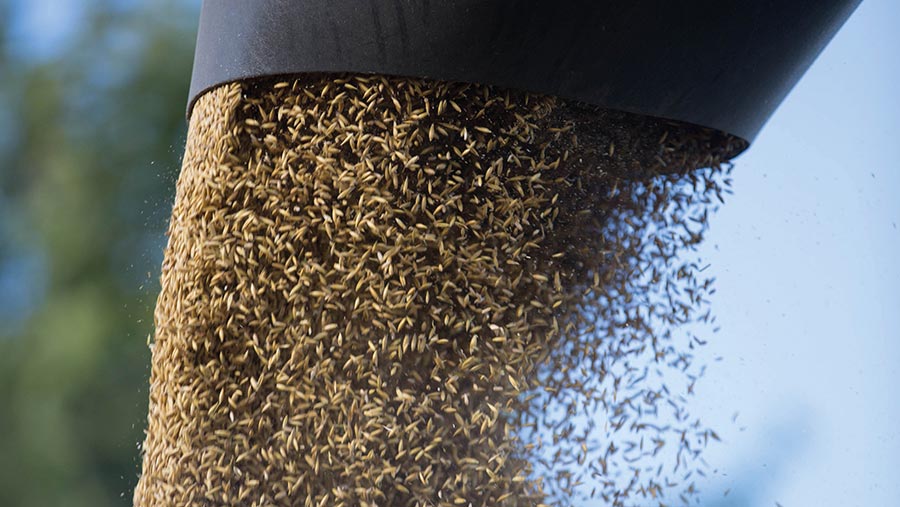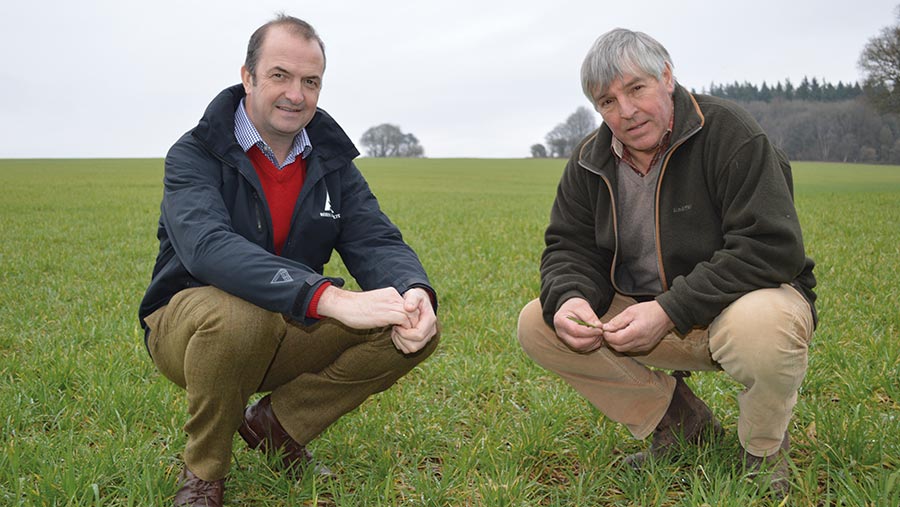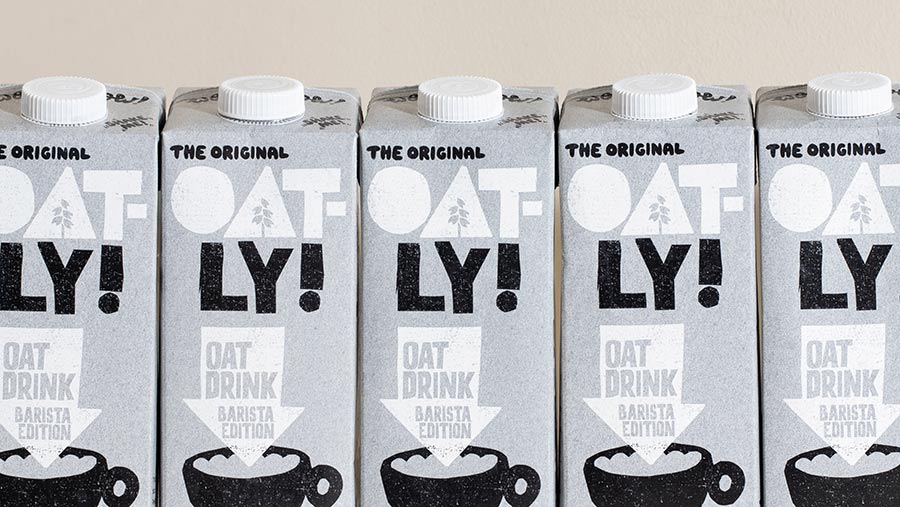Oat growers turn to expanding plant-based drinks market
 © Tim Scrivener
© Tim Scrivener With brands such as Oatly and Alpro on the supermarket shelves, oat drinks are presenting producers with a good opportunity for a British provenanced and sustainable oat crop.
As an indication of the expanding market opportunity, Oatly, the world’s biggest oat drinks brand, plans to open one of the globe’s biggest plant-based drinks factories in Peterborough by 2023.
They plan to tap into this growing consumer demand and take advantage of Britain’s favourable maritime climate for growing oats.
We speak to two farmers who are focusing on growing quality oats for the drinks market and look at this expanding market.
See also: How to tackle the spring milling oat challenge
Chris Allen: Home Farm, Farleigh Wallop, south of Basingstoke
Chris Allen is returning to oats after a gap of a few years from growing the crop, and two-and-a-half years after his 220-strong Holstein-Friesian herd, with a high annual milk yield of 11,000 litres a cow, was dispersed.
The Hampshire farmer has turned to oats to feed a rapidly growing oat drinks market and reduce imports and is part of 25-plus band of oat growers set to harvest a 2021 crop that will manufacture the first UK-produced oat drink from “field to carton”.
“We are always looking for crops to add value and this fits into a healthy food market, which is building momentum and has become quite popular,” Mr Allen says from his farm just south of Basingstoke.
Last autumn, he drilled more than 44ha of Mascani on the 1,200ha of largely arable land he farms at – half as tenants Fordham and Allen on Portsmouth Estates, and the other half in a contract farming deal with the estate.
He already grows added-value cereals such as Maris Otter and Craft winter barleys for brewing or Laureate spring barley to make upmarket Bimber vodka and gin, and his wheat heads to the premium milling market.
Mr Allen is looking for a yield of up to 7.5t/ha from the winter oats on his soils, which vary from easily worked chalk loams to heavy clay caps, just south of the M3.
The oats will replace some of his oilseed rape area, as he has given up growing the crop due to severe cabbage stem flea beetle damage.
He recognises the crop has a shorter harvest window than many other cereals to cut grain when the quality is high, but is confident that he has the combine capacity and relatively small crop area to cope.

Jonathan Arnold (left), trading director of Robin Appel, and Hampshire grower Chris Allen © MAG/David Jones
Peveril Bruce: Matterley Farm, east of Winchester
A few miles south-west of Mr Allen, fellow Hampshire farmer Perevil Bruce, is still milking 220 cows, and has also turned to oats to feed this growth market and as an alternative to oilseed rape on his downland farm.
“We have struggled with oilseed rape and now are looking for a break crop, with winter oats and winter linseed filling in,” he says.
Mr Bruce is also optimistic about yields and prospects for his winter oats crop after he drilled 34ha of Mascani last autumn, and is looking for a yield above 6.25t/ha.
He farms 800ha at Matterley Farm, just east of Winchester on the edge of the rolling South Down, with average winter wheat yields on his chalky soils of just over 8t/ha.
Although he is milking 220 cows, he is happy to be growing the oats for the new venture as he sees it as a growth market.
Contracts
Both farmers are growing for grain merchant Robin Appel, which is looking for 5,000-10,000t of extra oats this season for a new venture that will supply some of the biggest brands in the liquid oats market.
Jonathan Arnold, the group’s trading director, says the oat drinks market is never going to take over from the dairy industry, but it is aimed at an expanding market for those who don’t or can’t drink milk.
“This is a whole new market that is expanding dramatically, and we will be looking for new growers in the future,” he says.
His group, which is already a major player in the malting barley market, is not a newcomer to the oats market as it supplies grain to some of the big oat millers.
It has contracts with 100-plus growers for 30,000t of oats annually from farms stretching from Cornwall to the Scottish border, to supply the likes of Morning Foods in Crewe and Richardson Milling of Bedford.
With this strong following of growers, it is now moving into other growth oat markets.
Heavy investment is planned to increase capacity and update facilities at both Crewe and Bedford, and with the new Oatly Peterborough plant this is likely to lead to an increased requirement for oats of about 100,000t in a few year’s time.
This will offer growers further marketing opportunities for this low-input cereal crop, and help them to reduce their carbon footprint, and is likely to find favour in future Environmental Land Management (ELM) schemes.
Mr Arnold has organised his new 25-plus oat growers to grow the established and old favourite quality winter oat variety Mascani or the new high-quality, spring variety Isabel, which has the highest specific weight on the AHDB Recommended List of varieties.
Quality requirements
The key requirement is to grow these two quality oat varieties at a minimum specific weight of 50kg/hl, and the contracted price will be at a slight discount to feed wheat futures, and the contract will allow growers to lock in prices when it suits them.
The harvested grain will be de-hulled and stabilised, and then transported to Shepton Mallet in Somerset, where the grain trader has formed a joint venture with food processing group Framptons.
The new venture, called Plant Food Bases, will be making and packaging products that can be used in oat-based drinks, yoghurt, ice cream, custard, and other desserts and savoury products, including vegetarian and vegan ranges.
Mr Arnold points out this venture is a great opportunity for growers, as the majority of these products using oats are imported either in the finished form or in a syrup state to be mixed and packaged in the UK.
He is also looking for the future at pulse crops, such as peas and beans, for contracts with growers for use in plant-based drinks, and also as a base for meat substitutes and vegan cheeses.
Top brands

© AdobeStock
The two leading brands for oat drinks are Oatly, which is a vegan brand from Sweden, and Alpro, which is owned by the world’s largest yoghurt maker, the Paris-based group Danone.
In March, Oatly announced plans for a new plant in Peterborough to open in 2023, which will have an annual capacity to make 300m litres of oat drink, with scope to push that up to 450m litres and create at least 200 jobs.
The group says that the UK market has become an important driver of its growth, and overall its worldwide sales reached £144m in 2019 and was predicted to nearly double in 2020.
This rapid growth prompted the Malmo-based group to announce plans in February to float the company on the US stock market in a move that could value the business at as much as $10bn despite the group being currently loss-making.
UK sales of plant-based drinks jumped 16% to £278m in the past year, according to data company Nielsen, and within that, oat drink sales more than doubled to £73m.
Historically, those plant-based drinks containing soya and almond have been UK market leaders, but oats is rapidly eclipsing these in growth terms, helped by its local provenance and enhanced sustainability credentials.
In the US, oat drinks have become the second-bestselling plant-based drink after almond-based drinks, pushing ahead of the once-popular soya.
Oatly has seen strong growth since entering the US market in 2016, although the buoyant market has attracted many competitors.
This has been driven by a consumer shift towards environmentally friendly products helping to drive sales, and make Oatly the top-selling oat drink among retailers in the US, Sweden, Germany and the UK.
Back in the UK, Will Martin, business development director at Framptons, is also seeing similar growth, with oat products performing well. His group is a “co-packer” that processes and packages a wide range of products for brand owners.
He says recent customer demand, based on several hundred new product enquiries a year, has shown a shift towards plant-based formulas, with eight out of 10 enquiries being plant-based and, of these, five are typically oat-based.

